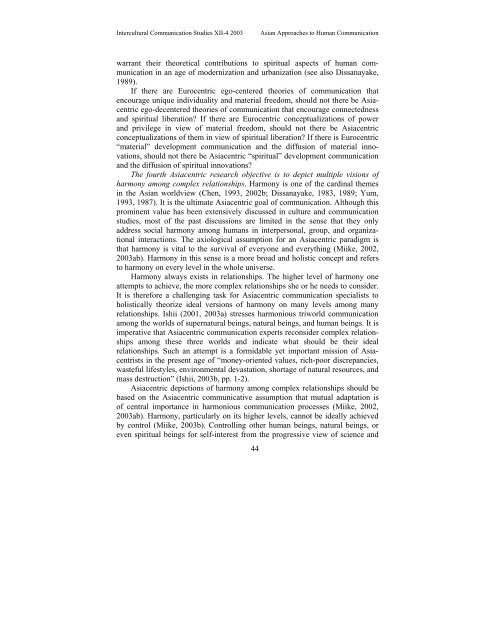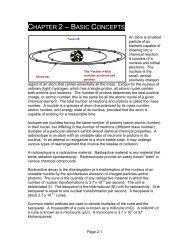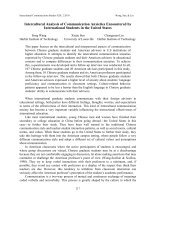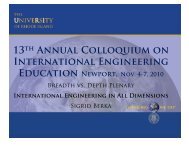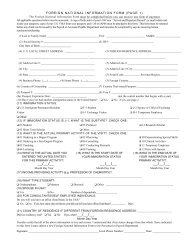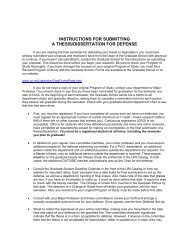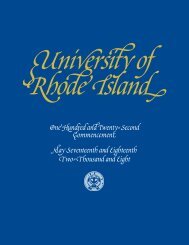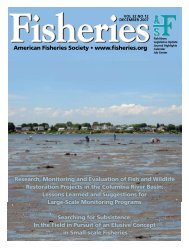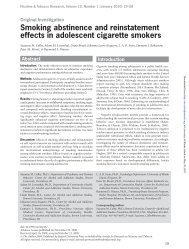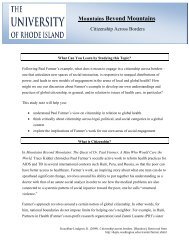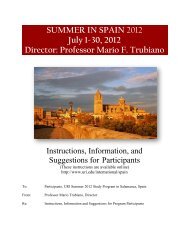asian approaches to human communication - University of Rhode ...
asian approaches to human communication - University of Rhode ...
asian approaches to human communication - University of Rhode ...
You also want an ePaper? Increase the reach of your titles
YUMPU automatically turns print PDFs into web optimized ePapers that Google loves.
Intercultural Communication Studies XII-4 2003 Asian Approaches <strong>to</strong> Human Communication<br />
warrant their theoretical contributions <strong>to</strong> spiritual aspects <strong>of</strong> <strong>human</strong> <strong>communication</strong><br />
in an age <strong>of</strong> modernization and urbanization (see also Dissanayake,<br />
1989).<br />
If there are Eurocentric ego-centered theories <strong>of</strong> <strong>communication</strong> that<br />
encourage unique individuality and material freedom, should not there be Asiacentric<br />
ego-decentered theories <strong>of</strong> <strong>communication</strong> that encourage connectedness<br />
and spiritual liberation? If there are Eurocentric conceptualizations <strong>of</strong> power<br />
and privilege in view <strong>of</strong> material freedom, should not there be Asiacentric<br />
conceptualizations <strong>of</strong> them in view <strong>of</strong> spiritual liberation? If there is Eurocentric<br />
“material” development <strong>communication</strong> and the diffusion <strong>of</strong> material innovations,<br />
should not there be Asiacentric “spiritual” development <strong>communication</strong><br />
and the diffusion <strong>of</strong> spiritual innovations?<br />
The fourth Asiacentric research objective is <strong>to</strong> depict multiple visions <strong>of</strong><br />
harmony among complex relationships. Harmony is one <strong>of</strong> the cardinal themes<br />
in the Asian worldview (Chen, 1993, 2002b; Dissanayake, 1983, 1989; Yum,<br />
1993, 1987). It is the ultimate Asiacentric goal <strong>of</strong> <strong>communication</strong>. Although this<br />
prominent value has been extensively discussed in culture and <strong>communication</strong><br />
studies, most <strong>of</strong> the past discussions are limited in the sense that they only<br />
address social harmony among <strong>human</strong>s in interpersonal, group, and organizational<br />
interactions. The axiological assumption for an Asiacentric paradigm is<br />
that harmony is vital <strong>to</strong> the survival <strong>of</strong> everyone and everything (Miike, 2002,<br />
2003ab). Harmony in this sense is a more broad and holistic concept and refers<br />
<strong>to</strong> harmony on every level in the whole universe.<br />
Harmony always exists in relationships. The higher level <strong>of</strong> harmony one<br />
attempts <strong>to</strong> achieve, the more complex relationships she or he needs <strong>to</strong> consider.<br />
It is therefore a challenging task for Asiacentric <strong>communication</strong> specialists <strong>to</strong><br />
holistically theorize ideal versions <strong>of</strong> harmony on many levels among many<br />
relationships. Ishii (2001, 2003a) stresses harmonious triworld <strong>communication</strong><br />
among the worlds <strong>of</strong> supernatural beings, natural beings, and <strong>human</strong> beings. It is<br />
imperative that Asiacentric <strong>communication</strong> experts reconsider complex relationships<br />
among these three worlds and indicate what should be their ideal<br />
relationships. Such an attempt is a formidable yet important mission <strong>of</strong> Asiacentrists<br />
in the present age <strong>of</strong> “money-oriented values, rich-poor discrepancies,<br />
wasteful lifestyles, environmental devastation, shortage <strong>of</strong> natural resources, and<br />
mass destruction” (Ishii, 2003b, pp. 1-2).<br />
Asiacentric depictions <strong>of</strong> harmony among complex relationships should be<br />
based on the Asiacentric communicative assumption that mutual adaptation is<br />
<strong>of</strong> central importance in harmonious <strong>communication</strong> processes (Miike, 2002,<br />
2003ab). Harmony, particularly on its higher levels, cannot be ideally achieved<br />
by control (Miike, 2003b). Controlling other <strong>human</strong> beings, natural beings, or<br />
even spiritual beings for self-interest from the progressive view <strong>of</strong> science and<br />
44


